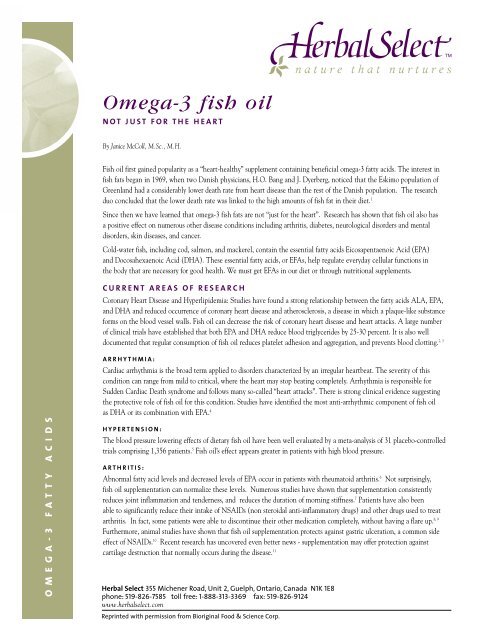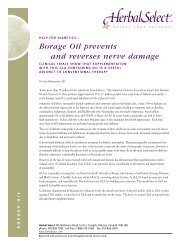Omega-3 fish oil - Herbal Select
Omega-3 fish oil - Herbal Select
Omega-3 fish oil - Herbal Select
Create successful ePaper yourself
Turn your PDF publications into a flip-book with our unique Google optimized e-Paper software.
<strong>Omega</strong>-3 <strong>fish</strong> <strong>oil</strong><br />
NOT JUST FOR THE HEART<br />
By Janice McColl, M.Sc., M.H.<br />
Fish <strong>oil</strong> first gained popularity as a “heart-healthy” supplement containing beneficial omega-3 fatty acids. The interest in<br />
<strong>fish</strong> fats began in 1969, when two Danish physicians, H.O. Bang and J. Dyerberg, noticed that the Eskimo population of<br />
Greenland had a considerably lower death rate from heart disease than the rest of the Danish population. The research<br />
duo concluded that the lower death rate was linked to the high amounts of <strong>fish</strong> fat in their diet. 1<br />
Since then we have learned that omega-3 <strong>fish</strong> fats are not “just for the heart”. Research has shown that <strong>fish</strong> <strong>oil</strong> also has<br />
a positive effect on numerous other disease conditions including arthritis, diabetes, neurological disorders and mental<br />
disorders, skin diseases, and cancer.<br />
Cold-water <strong>fish</strong>, including cod, salmon, and mackerel, contain the essential fatty acids Eicosapentaenoic Acid (EPA)<br />
and Docosahexaenoic Acid (DHA). These essential fatty acids, or EFAs, help regulate everyday cellular functions in<br />
the body that are necessary for good health. We must get EFAs in our diet or through nutritional supplements.<br />
CURRENT AREAS OF RESEARCH<br />
Coronary Heart Disease and Hyperlipidemia: Studies have found a strong relationship between the fatty acids ALA, EPA,<br />
and DHA and reduced occurrence of coronary heart disease and atherosclerosis, a disease in which a plaque-like substance<br />
forms on the blood vessel walls. Fish <strong>oil</strong> can decrease the risk of coronary heart disease and heart attacks. A large number<br />
of clinical trials have established that both EPA and DHA reduce blood triglycerides by 25-30 percent. It is also well<br />
documented that regular consumption of <strong>fish</strong> <strong>oil</strong> reduces platelet adhesion and aggregation, and prevents blood clotting. 2, 3<br />
ARRHYTHMIA:<br />
Cardiac arrhythmia is the broad term applied to disorders characterized by an irregular heartbeat. The severity of this<br />
condition can range from mild to critical, where the heart may stop beating completely. Arrhythmia is responsible for<br />
Sudden Cardiac Death syndrome and follows many so-called “heart attacks”. There is strong clinical evidence suggesting<br />
the protective role of <strong>fish</strong> <strong>oil</strong> for this condition. Studies have identified the most anti-arrhythmic component of <strong>fish</strong> <strong>oil</strong><br />
as DHA or its combination with EPA. 4<br />
O M E G A - 3 F A T T Y A C I D S<br />
HYPERTENSION:<br />
The blood pressure lowering effects of dietary <strong>fish</strong> <strong>oil</strong> have been well evaluated by a meta-analysis of 31 placebo-controlled<br />
trials comprising 1,356 patients. 5 Fish <strong>oil</strong>’s effect appears greater in patients with high blood pressure.<br />
ARTHRITIS:<br />
Abnormal fatty acid levels and decreased levels of EPA occur in patients with rheumatoid arthritis. 6 Not surprisingly,<br />
<strong>fish</strong> <strong>oil</strong> supplementation can normalize these levels. Numerous studies have shown that supplementation consistently<br />
reduces joint inflammation and tenderness, and reduces the duration of morning stiffness. 7 Patients have also been<br />
able to significantly reduce their intake of NSAIDs (non steroidal anti-inflammatory drugs) and other drugs used to treat<br />
arthritis. In fact, some patients were able to discontinue their other medication completely, without having a flare up. 8, 9<br />
Furthermore, animal studies have shown that <strong>fish</strong> <strong>oil</strong> supplementation protects against gastric ulceration, a common side<br />
effect of NSAIDs. 10 Recent research has uncovered even better news - supplementation may offer protection against<br />
cartilage destruction that normally occurs during the disease. 11<br />
<strong>Herbal</strong> <strong>Select</strong> 355 Michener Road, Unit 2, Guelph, Ontario, Canada N1K 1E8<br />
phone: 519-826-7585 toll free: 1-888-313-3369 fax: 519-826-9124<br />
www.herbalselect.com<br />
Reprinted with permission from Bioriginal Food & Science Corp.
O M E G A - 3 F A T T Y A C I D S<br />
SKIN DISEASE:<br />
Essential fatty acids are well known to improve many skin disorders, including dry, itchy, inflamed skin. These good<br />
fats improve the barrier function of the skin and help prevent moisture loss. Fish <strong>oil</strong> supplementation is especially<br />
12, 13<br />
effective in the treatment of psoriasis. Even increasing dietary consumption of <strong>oil</strong>y <strong>fish</strong> has proven beneficial in<br />
combating psoriasis. 14<br />
MENTAL DISORDERS:<br />
Currently scientists predict that <strong>fish</strong> <strong>oil</strong> may alleviate certain mental disorders. A group of 16 patients with bipolar<br />
disorder (“manic depression”) who took <strong>fish</strong> <strong>oil</strong> for four months experienced much longer periods of remission than<br />
those given a placebo. Only 13 percent of patients receiving <strong>fish</strong> <strong>oil</strong> experienced the recurrence of mania or depression,<br />
compared to more than 50 percent in the placebo group. A group of researchers from the United Kingdom also found<br />
that schizophrenic patients who consume more ALA, DHA and EPA in their diet or receive them as supplements have<br />
15, 16<br />
less severe symptoms. Studies suggest that depression may also be related to insufficient amounts of these EFAs.<br />
Deficiency of ALA, EPA and DHA also plays a role in a significant number of other mental disorders including<br />
aggression, depression, dementia, and Attention Deficit Hyperactivity Disorder.<br />
DIABETES:<br />
Individuals with diabetes may benefit from <strong>fish</strong> <strong>oil</strong> supplementation for several reasons. Although the effect of <strong>fish</strong> <strong>oil</strong><br />
on blood glucose levels is controversial, both epidemiological and animal studies indicate that high <strong>fish</strong> consumption may<br />
17, 18<br />
reduce the incidence of diabetes. Secondly, supplementation clearly has numerous positive effects for the diabetic<br />
through reduction of triglycerides, blood pressure, and platelet aggregation. Thirdly, supplementation may provide a<br />
protective effect on nerve function - to help protect against diabetic neuropathy, a degenerative complication of<br />
diabetes. 19<br />
MULTIPLE SCLEROSIS:<br />
There is considerable statistical evidence that the incidence of multiple sclerosis varies in countries where the diet differs.<br />
This data seems to show that the presence of ALA, EPA, and DHA may result in a lower incidence of this disease. A<br />
study published in 1989 looked at the long-term effects of ALA, EPA, and DHA in the treatment of multiple sclerosis. 20<br />
The study concluded that there were improvements in the treated group when compared to the control group in terms<br />
of duration, frequency and severity of relapses and the number of patients who either improved or remained unchanged.<br />
CANCER:<br />
In some studies, it has been hypothesized that highly unsaturated fatty acids, found primarily in <strong>fish</strong> <strong>oil</strong>, could be used as<br />
a protective agent against certain cancers. Some studies on animals have shown that these fatty acids may decrease both<br />
the number and size of tumors; however the studies are still in the early stages. 21<br />
CROHN’S DISEASE:<br />
A recent study has shown the effectiveness of <strong>fish</strong> <strong>oil</strong> in the maintenance of remission of Crohn’s disease. Fifty patients<br />
were treated with an ALA, EPA, and DHA mixture or a placebo for 12 months. After the study was completed the rate of<br />
severe recurrences in the group treated with <strong>fish</strong> <strong>oil</strong> was 34 percent compared to 62 percent in placebo-treated patients. 22<br />
PREGNANCY AND FETAL HEALTH:<br />
There is a small but noticeable worldwide tendency towards shorter pregnancies, which may have a negative effect on<br />
fetal development. It is suggested that an EFA deficiency may be responsible for the change. A study has shown that<br />
a diet rich in ALA, DHA and EPA may help lengthen pregnancy. Danish women who were given <strong>fish</strong> <strong>oil</strong> during their<br />
third trimester prolonged their pregnancies by four days. Fetuses, particularly in the third trimester, also require DHA<br />
to facilitate the development of brain and retinal tissue. 23<br />
<strong>Herbal</strong> <strong>Select</strong> 355 Michener Road, Unit 2, Guelph, Ontario, Canada N1K 1E8<br />
phone: 519-826-7585 toll free: 1-888-313-3369 fax: 519-826-9124<br />
www.herbalselect.com<br />
Reprinted with permission from Bioriginal Food & Science Corp.
O M E G A - 3 F A T T Y A C I D S<br />
CHILD DEVELOPMENT:<br />
DHA makes up 15-20 percent of the fat in the brain and 30-60 percent of the fat in the retina. Studies show that children<br />
24, 25<br />
who receive sufficient amounts of DHA are intellectually “better off” than children who are deficient.<br />
LUPUS ERYTHEMATOSUS (LE):<br />
Lupus has symptoms ranging from minor skin disorders to severe kidney damage. Several investigations have indicated that<br />
<strong>fish</strong> <strong>oil</strong> could have a favorable effect on the disease. A 34-week, double-blind study was done involving 34 patients with<br />
lupus. Fourteen of the 17 patients using <strong>fish</strong> <strong>oil</strong> saw their condition improve, while 13 from the placebo group were rated<br />
worse or experienced no change. 7<br />
IGA NEPHROPATHY:<br />
Mesangial IgA nephropathy is a common disease of the kidney, which usually causes renal failure within 10 to 20 years. A<br />
treatment that can help prevent renal failure in IgA nephropathy has not yet been found. However, some studies suggest<br />
that <strong>fish</strong> <strong>oil</strong> may have a beneficial effect in slowing the progression of this disease. Fish <strong>oil</strong> has been reported to prevent<br />
26, 27<br />
deterioration of renal function in experimental models of the disease.<br />
A VERY SAFE SUPPLEMENT<br />
Fish <strong>oil</strong> products are very safe. Researchers have used dosages as high as 15 grams per day and have not observed any<br />
significant side effects. Patients receiving anticoagulant therapy or recovering from stroke should exercise caution while<br />
supplementing with <strong>fish</strong> <strong>oil</strong> since it may exert blood thinning properties.<br />
WHY SUPPLEMENT?<br />
Fish <strong>oil</strong> contains the fatty acids EPA and DHA, which are as important to good health as other essential vitamins and<br />
minerals. EPA and DHA help maintain healthy cell membranes, which act as “gate-keepers” transporting nutrients inside<br />
and removing waste products from the cells. The higher the diet is in EFAs, the more fluid and flexible the membrane is,<br />
resulting in a more efficient exchange across the cell membrane. EPA and DHA can also help prevent and treat numerous<br />
conditions including heart disease, rheumatoid arthritis, mental disorders, multiple sclerosis, cancer, and others. The body<br />
can produce small amounts of EPA and DHA from Alpha Linolenic Acid (ALA), found in some natural sources such as<br />
flax seed. However, many factors in the typical North American lifestyle can impair the production of EPA and DHA:<br />
consumption of sugar, alcohol, saturated fats and trans-fatty acids, diabetes, aging, stress, prescription medications, and viral<br />
infections to name a few. Insufficient quantities of zinc, magnesium, and vitamins B6, C, and niacin also slow the process.<br />
Due to these factors, it is important to add omega-3 fatty acids from <strong>fish</strong> <strong>oil</strong>s into the diet through supplementation.<br />
<strong>Herbal</strong> <strong>Select</strong> 355 Michener Road, Unit 2, Guelph, Ontario, Canada N1K 1E8<br />
phone: 519-826-7585 toll free: 1-888-313-3369 fax: 519-826-9124<br />
www.herbalselect.com<br />
Reprinted with permission from Bioriginal Food & Science Corp.
O M E G A - 3 F A T T Y A C I D S<br />
REFERENCES<br />
1. Bang, H.O., Dyerberg, J., Hjoorne, N. The composition of food consumed by Greenland Eskimos.<br />
Acta Medica Scandinavica, Vol. 200, pp 69-73, (1976).<br />
2. Harris, W.S. n-3 Fatty acids and serum lipoproteins: human studies American Journal of<br />
Clinical Nutrition, Vol. 65 (suppl): pp 1645S-54S, (1997).<br />
3. Willatts P., et al. Effect of long-chain polyunsaturated fatty acids in infant formula on problem<br />
solving at 10 months of age. Lancet, Vol. 352, pp 688-691, (1998).<br />
4. Hursting S.D., et al. Types of dietary fat and the incidence of cancer at five sites.<br />
Prevention Medicine, Vol. 19, pp 242 - 253, (1990).<br />
5. Appel L.J., et al. Does Supplementation of Diet with ‘Fish Oil’ Reduce Blood Pressure’?<br />
A Meta-analysis of Controlled Clinical Trials. Archives of Internal Medicine, Vol. 153 (12), pp 1429-38, (1993).<br />
6. Navarro E, Esteve M, Olive A, Klaassen J, Cabre E, Tena X, Fernandez-Banares F, Pastor C, Gassull MA<br />
Abnormal fatty acid pattern in rheumatoid arthritis. A rationale for treatment with marine and botanical lipids.<br />
Journal of Rheumatology, 2000 Feb;27(2):298-303.<br />
7. Kremer JM. n-3 fatty acid supplements in rheumatoid arthritis.<br />
American Journal of Clinical Nutrition, 2000 Jan;71(1 Suppl):349S-351S.<br />
8. Kremer JM, Lawrence DA, Petrillo GF, Litts LL, Mullaly PM, Rynes RI, Stocker RP, Parhami N, Greenstein NS,<br />
Fuchs BR et al. Effects of high-dose <strong>fish</strong> <strong>oil</strong> on rheumatoid arthritis after stopping nonsteroidal antiinflammatory drugs.<br />
Clinical and immune correlates. Arthritis and Rheumatism, 1995;38(8):1107-1114.<br />
9. Lau CS, Morley KD, Belch JJ. Effects of <strong>fish</strong> <strong>oil</strong> supplementation on non-steroidal anti-inflammatory drug<br />
requirement in patients with mild rheumatoid arthritis - a double-blind placebo controlled study.<br />
British Journal Rheumatology, 1993;32:982-989.<br />
10. Manjari V, Das UN Effect of polyunsaturated fatty acids on dexamethasone-induced gastric mucosal damage.<br />
Prostaglandins Leukotrienes and Essential Fatty Acids, 2000 Feb;62(2):85-96.<br />
11. Curtis CL, Hughes CE, Flannery CR, Little CB, Harwood JL, Caterson B. n-3 fatty acids specifically modulate catabolic<br />
factors involved in articular cartilage degradation. Journal of Biological Chemistry, 2000 Jan. 14;275(2):721-724.<br />
12. Grimminger F, Mayser P, Papavassilis C, Thomas M, Schlotzer E, Heuer KU, Fuhrer D, Hinsch KD, Walmrath D,<br />
Schill WB, et al . A double-blind, randomized, placebo-controlled trial of n-3 fatty acid based lipid infusion in acute,<br />
extended guttate psoriasis. Rapid improvement of clinical manifestations and changes in neutrophil leukotriene profile.<br />
Clinical Investigation, 1993 Aug. 71(8):634-643.<br />
13. Gupta AK, Ellis CN, Tellner DC, Anderson TF, Voorhees JJ. Double-blind, placebo-controlled study to evaluate<br />
the efficacy of <strong>fish</strong> <strong>oil</strong> and low-dose UVB in the treatment of psoriasis. British Journal of Dermatology, 1989<br />
June;120(6):801-7.<br />
14. Collier PM, Ursell A, Zaremba K, Payne CM, Staughton RC, Sanders T. Effect of regular consumption of <strong>oil</strong>y <strong>fish</strong><br />
compared with white <strong>fish</strong> on chronic plaque psoriasis. European Journal of Clinical Nutrition, 1993 Apr;47(4):251-254.<br />
15. Hibbein J. Fish consumption and major depression. Lancet, Vol. 351,pp 1213, (1998).<br />
<strong>Herbal</strong> <strong>Select</strong> 355 Michener Road, Unit 2, Guelph, Ontario, Canada N1K 1E8<br />
phone: 519-826-7585 toll free: 1-888-313-3369 fax: 519-826-9124<br />
www.herbalselect.com<br />
Reprinted with permission from Bioriginal Food & Science Corp.
O M E G A - 3 F A T T Y A C I D S<br />
16. Stoll A.L., et al. <strong>Omega</strong> 3 Fatty Acids in Bipolar Disorder. A Preliminary Double-blind, Placebo-Controlled Trial.<br />
Archives of General Psychiatry, Vol. 56, pp 407-412, (1999).<br />
17. Adler AI, Boyko EJ, Schraer CD, Murphy NJ. Lower prevalence of impaired glucose tolerance and diabetes associated<br />
with daily seal <strong>oil</strong> or salmon consumption among Alaska Natives. Diabetes Care,1994;17:1498-1501.<br />
18. Nobukata H, Ishikawa T, Obata M, Shibutani Y. Long-term administration of highly purified eicosapentaenoic<br />
acid ethyl ester prevents diabetes and abnormalities of blood coagulation in male WBN/Kob rats.<br />
Metabolism, 2000 Jul;49(7):912-919.<br />
19. Gerbi A, Maixent JM, Barbey O, Jamme I, Pierlovisi M, Coste T, Pieroni G, Nouvelot A, Vague P, Raccah D.<br />
Neuroprotective effect of <strong>fish</strong> <strong>oil</strong> in diabetic neuropathy. Lipids, 1999;34, S93-94.<br />
20. Bates D., et al. A double-blind controlled trial of long chain n-3 polyunsaturated fatty acids in the treatment<br />
of multiple sclerosis. Journal of Neurology and Psychiatry, Vol. 52(1), pp18-22, (1989).<br />
21. Hursting S.D., et al. Types of dietary fat and the incidence of cancer at five sites.<br />
Prevention Medicine, Vol. 19, pp 242 - 253, (1990).<br />
22. Belluzzi, A., et al. Effect of an enteric-coated <strong>fish</strong>-<strong>oil</strong> preparation on relapses in Crohn’s disease.<br />
New England Journal of Medicine, Vol. 334, pp 1557-1560, (1996).<br />
23. McLennan P., et al. The cardiovascular protective role of docosahexaenoic acid.<br />
European Journal of Pharmacology, Vol. 300, pp 83-89, (1995).<br />
24. Anderson g.l., Docosahexaenoic acid is the preferred dietary n-3 fatty acid for the development<br />
of the brain and retina. Pediatric Research, Vol. 27 (1), pp 89-97, (1990).<br />
25. Walton A.J., et al. Dietary <strong>fish</strong> <strong>oil</strong> and the severity of symptoms in patients with systemic lupus erythematosus.<br />
Annals of the Rheumatic Diseases, Vol. 50 (7), pp 467-466, (1991).<br />
26. Bennet W.M., et al. Treatment of IgA nephropathy with eicosapentanoic acid (EPA):<br />
a two year prospective trial. Clinical Nephrology, Vol. 31, pp 128-131, (1989).<br />
27. Fung S.M. et al. Fish <strong>oil</strong> therapy in IgA Nephropathy. Annals of Pharmacy, Vol. 31, pp 112-115, (1997).<br />
<strong>Herbal</strong> <strong>Select</strong> 355 Michener Road, Unit 2, Guelph, Ontario, Canada N1K 1E8<br />
phone: 519-826-7585 toll free: 1-888-313-3369 fax: 519-826-9124<br />
www.herbalselect.com<br />
Reprinted with permission from Bioriginal Food & Science Corp.





